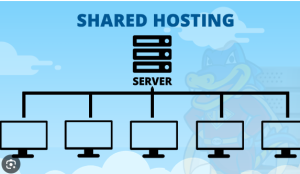Introduction (150-200 words)
Explain the concept of shared web hosting, where multiple websites share resources on a single server. Highlight its popularity due to affordability and ease of use.
What is Shared Web Hosting? (300-400 words)
Define shared hosting in detail, discussing how it operates, the sharing of server resources (CPU, RAM, disk space), and the hosting provider’s role in managing the server.
Pros of Shared Hosting (400-500 words)
- Cost-Effectiveness: Discuss how shared hosting is budget-friendly, making it ideal for beginners, small businesses, or blogs.
- Ease of Setup: Highlight the simplicity and speed of setting up a website on a shared hosting plan.
- Maintenance and Support: Mention the managed services provided by hosting companies, including maintenance, updates, and customer support.
Cons of Shared Hosting (400-500 words)
- Performance Issues: Discuss potential drawbacks like slower loading times due to sharing resources with other websites.
- Security Concerns: Highlight the risks associated with sharing a server, including security vulnerabilities and potential threats.
- Limited Resources: Discuss limitations on resources and scalability compared to other hosting options.
Who Should Opt for Shared Hosting? (300-400 words)
Detail the ideal candidates for shared hosting, such as bloggers, small businesses, or those with budget constraints. Explain the factors to consider before choosing shared hosting.
Tips for Choosing a Shared Hosting Provider (300-400 words)
- Reliability and Uptime: Emphasize the importance of a reliable hosting provider with good uptime guarantees.
- Customer Support: Discuss the significance of responsive and knowledgeable customer support.
- Scalability Options: Advise on choosing a host that offers scalability options for potential future growth.
Conclusion (150-200 words)
Summarize the key points discussed in the article. Reinforce that while shared hosting has its advantages, it’s crucial to consider individual website needs before making a choice.
Introduction
Web hosting is a critical decision for anyone starting a website, and shared hosting often emerges as an accessible and economical choice. Shared hosting involves multiple websites sharing resources on a single server. While it has its merits, determining whether shared web hosting is a good fit requires a closer examination of its advantages, limitations, and suitability for different types of websites.
Advantages of Shared Web Hosting
1. Cost-Effectiveness
Shared hosting typically offers the most budget-friendly plans, making it an ideal choice for beginners or small businesses operating on a limited budget. The costs are distributed among multiple users, resulting in significantly lower monthly fees.
2. User-Friendly Setup
Most shared hosting providers offer user-friendly interfaces and tools that simplify website setup, making it accessible for those without technical expertise. The setup process is often straightforward, involving a few clicks to install popular content management systems like WordPress or Joomla.
3. Maintenance and Support
Shared hosting services commonly provide technical support and handle server maintenance tasks, including software updates, security patches, and server monitoring. This frees users from the burden of managing these aspects themselves.
Limitations of Shared Hosting
1. Performance Constraints
Since multiple websites share the same server resources, increased traffic or resource usage by one website can impact the performance of others on the server. This may result in slower loading times during peak traffic hours.
2. Security Risks
The shared environment poses security risks. If one site on the server experiences a security breach, it could potentially affect other sites hosted on the same server. However, reputable hosting providers implement security measures to mitigate these risks.
3. Resource Limitations
Shared hosting plans often come with limitations on resources such as disk space, bandwidth, and CPU usage. Websites that experience rapid growth or require higher resource allocations may outgrow shared hosting and need to upgrade to more robust options.
Suitability of Shared Hosting for Different Websites
1. Personal Blogs and Small Websites
Shared hosting is well-suited for personal blogs, portfolios, or small business websites with moderate traffic. It provides adequate resources at an affordable price for these types of sites.
2. E-commerce Sites
While shared hosting can support small to medium-sized e-commerce sites initially, as the site grows and experiences increased traffic or transactions, it may necessitate a shift to more scalable hosting options like VPS or dedicated servers.
3. Resource-Intensive Websites
Websites that rely heavily on resource-intensive applications, streaming services, or consistently high traffic might find shared hosting restrictive. Such websites would benefit from hosting solutions offering dedicated resources.
Conclusion
Shared web hosting offers an affordable entry point for hosting websites, particularly for beginners or those with budget constraints. However, its limitations in performance, security, and resource allocation should be considered when assessing its suitability for different types of websites. Understanding your website’s specific needs and growth potential is crucial in determining whether shared hosting is the right choice or if an upgrade to more robust hosting solutions is necessary.
Introduction to Shared Web Hosting (150-200 words)
Shared web hosting is a popular choice among beginners due to its affordability and ease of use. It involves hosting multiple websites on a single server, sharing its resources like CPU, RAM, and bandwidth. This guide will delve into the pros and cons of shared hosting to help you make an informed decision.
Pros of Shared Web Hosting (500-600 words)
- Cost-Effective: Shared hosting is budget-friendly, ideal for startups and small businesses looking to establish an online presence without heavy expenses.
- Ease of Setup: Hosting providers simplify the setup process, offering user-friendly interfaces and tools for website management.
- Maintenance and Support: Providers often manage server maintenance, security updates, and offer customer support, reducing your technical responsibilities.
- Scalability Options: While shared hosting may have limitations, most providers offer scalable plans allowing upgrades as your website grows.
- Suitable for Beginners: Its simplicity makes it suitable for those new to website hosting and management.
Cons of Shared Web Hosting (500-600 words)
- Performance Issues: Since resources are shared, high traffic or resource-intensive websites on the same server can affect your site’s speed and performance.
- Limited Resources: Server resources are distributed among multiple users, potentially causing limitations during traffic spikes.
- Security Concerns: Vulnerabilities on one website can affect others on the same server. However, reputable hosting providers implement security measures to mitigate risks.
- Customization Limitations: Custom configurations and software installations might be restricted due to shared server environments.
- Potential Downtime: If a website on the server experiences issues, it can impact the uptime of other sites hosted on it.
Is Shared Web Hosting Suitable for You? (300-400 words)
- Consider Your Website’s Needs: If you expect low to moderate traffic initially and have a tight budget, shared hosting can be a good starting point.
- Future Growth Plans: Evaluate scalability options provided by the hosting company. Consider if shared hosting will accommodate your website’s growth in the long run.
- Security Concerns: Assess the hosting provider’s security measures and determine if they align with your website’s needs.
- Technical Expertise: Shared hosting requires less technical knowledge, but if you anticipate complex requirements, other hosting options might be more suitable.
Conclusion (100-150 words)
Shared web hosting can be a practical choice for those starting their online journey. Its affordability and user-friendly nature make it an accessible option for many. However, it’s crucial to weigh its limitations against your website’s specific needs and growth plans to make an informed decision.



